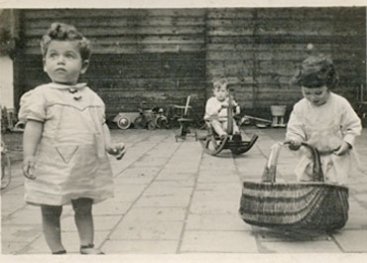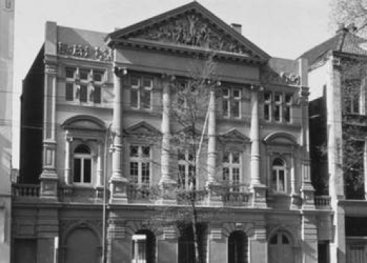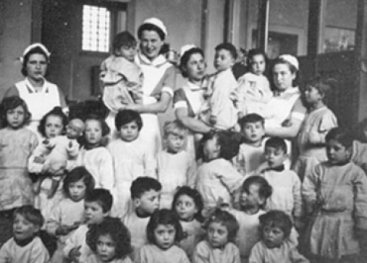
The Jewish Council in resistance
The Germans had set up a Jewish Council (De Joodse Raad), with the aim of making sure the deportation to the camps was executed in an orderly fashion. The Jewish Council workers registered everyone who reported to the former theatre Hollandsche Schouwburg.
Some people secretly removed registration cards from the card-index box and helped people escape from the Schouwburg. The director of the Jewish Council in the Schouwburg, Walter Süskind, organised these resistance activities.
Walter Süskind

Walter Süskind was born in Germany and spoke German well. He pretended to be best friends with the German commanders. He got them drunk during jolly evenings, while at the same time setting up a system to rescue as many children as possible from the Schouwburg and the day care centre across the street. He himself was eventually deported to Camp Auschwitz where he died in 1945.
 ‘I was 16 when I arrived in the Hollandsche Schouwburg by myself. Süskind immediately sent me on to the day care centre. I didn’t understand why; wasn’t I too old? Now I realise that he saw an opportunity: hiding a boy without parents in the day care centre quickly. And then have him rescued.’ Sal Kool
‘I was 16 when I arrived in the Hollandsche Schouwburg by myself. Süskind immediately sent me on to the day care centre. I didn’t understand why; wasn’t I too old? Now I realise that he saw an opportunity: hiding a boy without parents in the day care centre quickly. And then have him rescued.’ Sal Kool
 ‘I went to Walter Süskind every week. He would indicate how many children had to be taken from the day care centre. I would then find places for them to hide. Süskind had the general overview; he had everything under control.
‘I went to Walter Süskind every week. He would indicate how many children had to be taken from the day care centre. I would then find places for them to hide. Süskind had the general overview; he had everything under control.
Piet Meerburg, resistance worker
Bert de Vries Robles

Bert de Vries Robles.
De Vries Robles was one of the doctors working for the Jewish Council in the Hollandsche Schouwburg. Maurice Hirschel was a doctor’s assistant. Both had to go to the day care centre across the street regularly to see sick children. This allowed them to pass secret messages back and forth.
Raphaël (‘Felix’) Halverstad
Halverstad worked for the Jewish Council in the Hollandsche Schouwburg. He registered all the Jews that arrived. He noted down their names on a card in a card-index box. Halverstad was good at drawing and painting, and also at forgery. He took the names of the children off the cards. This meant they could escape.
Jacques van de Kar
He was a bicycle courier for the Jewish Council. ‘I had formed a group of between eight and ten young guys who, like me, had a bit of courage. We had created a crawl space in the Schouwburg where we would hide people. We would then smuggle them out of the building at night. I took every opportunity my job offered me to commit acts of resistance.’
I did what Süskind asked me to do. I soon realised that I was not only supposed to take care of the children; I was also supposed to help make children disappear. Fear? It wasn’t an issue. I probably suppressed it at the time.
Take care of the children
Lex van Weren and Jo Spier were appointed by the Jewish Council to take care of the children.
 ‘Like all other children, I had to go to the day care centre across the street. Then my father said: “Listen carefully. As soon as you see a chance, walk away from the line.” I said: “Bye dad, see you tomorrow”, and kissed him on the cheek. We went into the street, where the line was about four or five children wide. I put both hands in my pockets and halfway down the pavement I left the line, quietly kicked a little stone ahead of me and walked away very calmly. I kept walking, playing with that stone all the time. I felt an enormous tension inside. When was I going to feel the claws of a guard on my shoulder?’
‘Like all other children, I had to go to the day care centre across the street. Then my father said: “Listen carefully. As soon as you see a chance, walk away from the line.” I said: “Bye dad, see you tomorrow”, and kissed him on the cheek. We went into the street, where the line was about four or five children wide. I put both hands in my pockets and halfway down the pavement I left the line, quietly kicked a little stone ahead of me and walked away very calmly. I kept walking, playing with that stone all the time. I felt an enormous tension inside. When was I going to feel the claws of a guard on my shoulder?’
John Blom
 ‘I can remember playing between the chairs in the performance hall. There were folding chairs. That was until I had to go across the street, to the day care centre.’
‘I can remember playing between the chairs in the performance hall. There were folding chairs. That was until I had to go across the street, to the day care centre.’
Liesje de Hond
 ‘I don’t know where I was the first months after my birth. Perhaps with my mother in a hospital? Or maybe in the day care centre already? I will never know now.’
‘I don’t know where I was the first months after my birth. Perhaps with my mother in a hospital? Or maybe in the day care centre already? I will never know now.’
Foke Waterman
 ‘I went to the Schouwburg and asked parents: “Don’t you want to leave your child with us? We will make sure it goes to people who will take care of your child until you come back.” A few hours later I would go back to hear their decision. Most parents refused. Who would give their child away just like that, not knowing where they were going? They wanted to take care of the children themselves. I could understand that.’
‘I went to the Schouwburg and asked parents: “Don’t you want to leave your child with us? We will make sure it goes to people who will take care of your child until you come back.” A few hours later I would go back to hear their decision. Most parents refused. Who would give their child away just like that, not knowing where they were going? They wanted to take care of the children themselves. I could understand that.’
Sieny Kattenburg, child carer in the day care centre across the street from the former theatre Hollandsche Schouwburg
As a carer, I would go along on the walks. On the way back, there were suddenly a few children missing. I got a real fright and kept counting. Until Süskind told me it was all right. A few more children had managed to escape.

